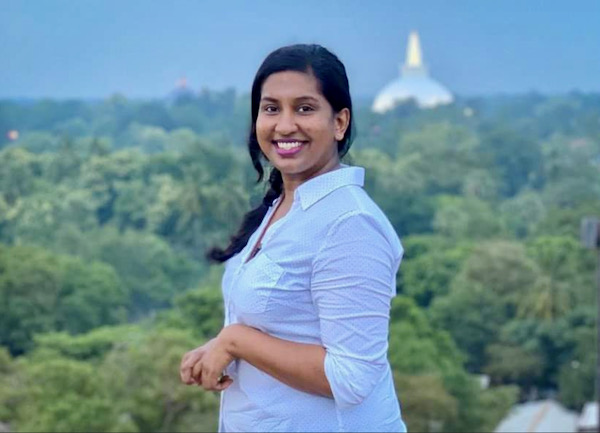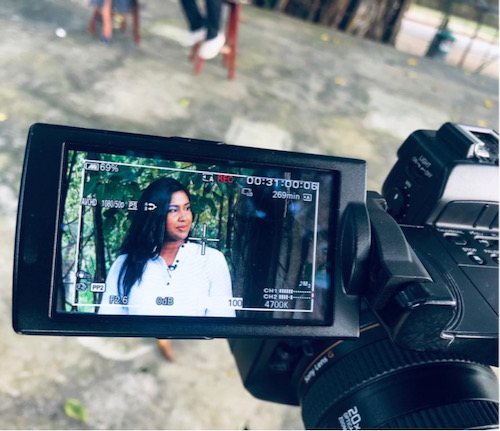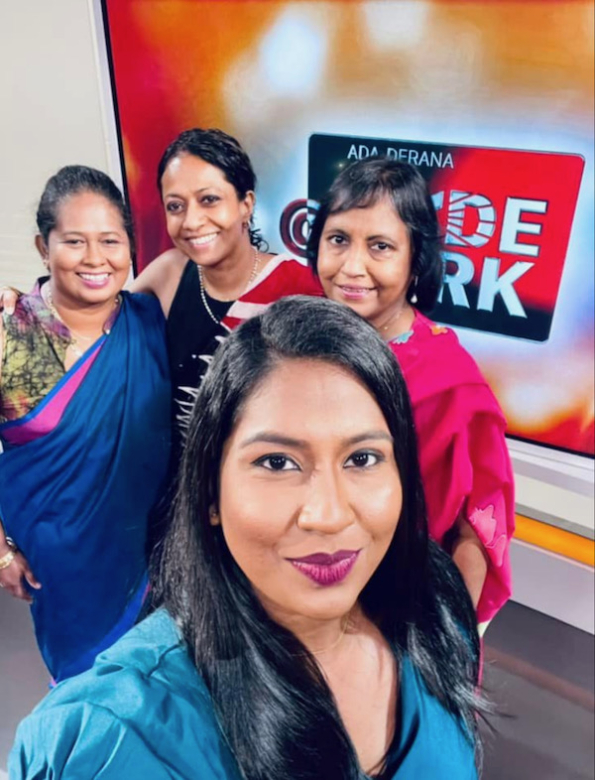A Conversation with IARJ board member Indeewari Amuwatte

EDITOR’S NOTE: Board member and IARJ co-founder Douglas Todd, based in Canada, shares this Q-and-A conversation with our colleague based in Sri Lanka.This is part of an ongoing series of profiles of IARJ board members from around the world. You may also enjoy reading our earlier conversation with Pedro Brieger of Argentina.
It has been a treat and a privilege to get to know Sri Lankan journalist Indeewari Amuwatte at IARJ conferences in Jakarta and Salt Lake City.
We have greatly valued hearing her presentation about the varied ways journalists covered the notorious Easter church bombings, which tore apart her beautiful country of 22 million in 2019.
Sri Lanka has an astonishingly wide range of religious groups. About 70 percent of Sri Lankans are Buddhist, while 13 percent are Hindu, 10 per cent are Muslim and 6 percent identify as Christian.
I asked Indeewari, who is now an IARJ board member, about the challenges of reporting on such diversity.

Q:
Tell us about yourself, your region and which media outlets you have worked for.
A:
I’m a broadcaster based in Colombo, Sri Lanka. I have covered Sri Lankan affairs for 16 years. That includes the final stages of civil war, which ended in 2009, to more recent developments in business, politics, religion and reconciliation. I began as a reporter at Channel One MTV (NewsFirst), then moved to ART Television for eight years and am now with Ada Derana. I host a weekly talk show, where I get to sit down with opinion leaders, academics, experts and politicians to delve deep into matters that affect every-day life here.
Q:
What made you choose religion as a focus of your journalism?
A:
Sri Lanka has seen frequent uprisings in 75 years of independence from the British. But this is also a country in which people have co-existed for centuries. Unfortunately, many politicians have choose to advance their agendas by dividing the fundamentally harmonious nature of our culture. And the media somehow play into this. I believe that ethical and unbiased reporting will not only uncover the truth but also heal the wounds of this country’s divisions.
Q:
What are some of the major religious issues in your country today?
A:
On one hand, it is safe to say religious institutions have largely failed the nation. On the other hand, extremism has risen its head. Youth radicalization is a big issue, which authorities are tackling. Influences from abroad continue to threaten the social fabric of this country. At the same time, there is hope for greater unity and harmony—as we see a majority of Sri Lankans continue to try to co-exist by looking past the bitter incidents of the past.
Q:
Please tell us about some reporting of which you are proud.
A:
I’ll take you to the most recent incident in Sri Lanka, which shocked the world. On April 21, 2019, four churches and three hotels in our island nation were attacked in broad daylight—all in the name of religion. As the country reeled, trying to understand the extremist elements that waged such horrific attacks, the situation soon grew worse as unrest built up in some religious communities. Even though the international media, and some local media reports, contributed to hatred being spread among segments of society, causing unnecessary division, our news teams were able to report factually, truthfully and with humility, so as to not aggravate one community or hurt each other. After all, we are dealing with sensitive issues, which must be handled delicately. This should be a collective effort by all media outlets. I strongly believe in formal training for journalists covering religion and faith. The media can break a nation—or unite one.
Q:
Have you faced hostility or criticism while reporting about religion?
A:
When you are committed to looking at a story from all angles, you make it part of life to report multiple sides of an incident. Naturally, however, individuals or parties who have an agenda to propagate hate among communities or people of various faiths will do everything in their power to shut down independent reporting. I too have faced intimidation, either to stop a story from being reported or from conducting interviews that do not augur well for certain parties. Hostility is shown in different ways. At times you can be bullied, physically assaulted, psychologically harassed. We have even seen fellow journalists face death as a result. I have been fortunate to move past a difficult time. Yet I’m able to tell these necessary stories.
Q:
Do you think religion is increasingly occupying the center stage of human affairs across the globe?
A:
Religion, faith or spirituality have always played a pivotal part in human life. They are at the center of civilizations. Today we are seeing trends in which religion is being used to propagate the agendas of a select few. That can translate to extremist acts of violence and unbelievable hate being spread among communities. Today, religion plays such a major role that it impacts and influences policy, politics, diplomacy, world trade and freedom of movement.
Q:
How do you think journalists can help in resolving religious conflicts?
A:
Journalists have a massive and important role to play in not just resolving conflicts based on religion, but more importantly in preventing such conflict. We can and should take the lead in ensuring that the stories we relate do not undermine one community or glorify another. We should not unduly hurt individuals of different faith or be the reason hate towards one community or people of a certain faith is instilled. Being a journalist requires a great responsibility towards society, communities and individuals.

